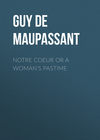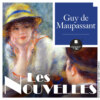Kitabı oku: «Notre Coeur or A Woman's Pastime», sayfa 13
The long village street stretched straight away in the middle of the valley between two rows of low, white, tile-roofed houses, some of them standing boldly up with their fronts close to the road, others, more retiring, situated in a garden where there was a lilac-bush in bloom and chickens scratching over manure-heaps, where wooden stairways in the open air climbed to doors cut in the wall. Peasants were at work before their dwellings, lazily fulfilling their domestic duties. An old woman, bent with age and with threads of gray in her yellow hair, for country folk rarely have white hair, passed close to him, a ragged jacket upon her shoulders and her lean and sinewy legs covered by a woolen petticoat that failed to conceal the angles and protuberances of her frame. She was looking aimlessly before her with expressionless eyes, eyes that had never looked on other objects than those that might be of use to her in her poor existence.
Another woman, younger than this one, was hanging out the family wash before her door. The lifting of her skirt as she raised her arms aloft disclosed to view thick, coarse ankles incased in blue knitted stockings, with great, projecting, fleshless bones, while the breast and shoulders, flat and broad as those of a man, told of a body whose form must have been horrible to behold.
Mariolle thought: "They are women! Those scarecrows are women!" The vision of Mme. de Burne arose before his eyes. He beheld her in all her elegance and beauty, the perfection of the human female form, coquettish and adorned to meet the looks of man, and again he smarted with the sorrow of an irreparable loss; then he walked on more quickly to shake himself free of this impression.
When he reached the inn at Marlotte the little waitress recognized him immediately, and accosted him almost familiarly: "Good day, Monsieur."
"Good day, Mademoiselle."
"Do you wish something to drink?"
"Yes, to begin with; then I will have dinner."
They discussed the question of what he should drink in the first place and what he should eat subsequently. He asked her advice for the pleasure of hearing her talk, for she had a nice way of expressing herself. She had a short little Parisian accent, and her speech was as unconstrained as was her movements. He thought as he listened: "The little girl is quite agreeable; she seems to me to have a bit of the cocotte about her."
"Are you a Parisian?" he inquired.
"Yes, sir."
"Have you been here long?"
"Two weeks, sir."
"And do you like it?"
"Not very well so far, but it is too soon to tell, and then I was tired of the air of Paris, and the country has done me good; that is why I made up my mind to come here. Then I shall bring you a vermouth, Monsieur?"
"Yes, Mademoiselle, and tell the cook to be careful and pay attention to my dinner."
"Never fear, Monsieur."
After she had gone away he went into the garden of the hotel, and took a seat in an arbor, where his vermouth was served. He remained there all the rest of the day, listening to a blackbird whistling in its cage, and watching the little waitress in her goings and comings. She played the coquette, and put on her sweetest looks for the gentleman, for she had not failed to observe that he found her to his liking.
He went away as he had done the day before after drinking a bottle of champagne to dispel gloom, but the darkness of the way and the coolness of the night air quickly dissipated his incipient tipsiness, and sorrow again took possession of his devoted soul. He thought: "What am I to do? Shall I remain here? Shall I be condemned for long to drag out this desolate way of living?" It was very late when he got to sleep.
The next morning he again installed himself in the hammock, and all at once the sight of a man casting his net inspired him with the idea of going fishing. The grocer from whom he bought his lines gave him some instructions upon the soothing sport, and even offered to go with him and act as his guide upon his first attempt. The offer was accepted, and between nine o'clock and noon Mariolle succeeded, by dint of vigorous exertion and unintermitting patience, in capturing three small fish.
When he had dispatched his breakfast he took up his march again for Marlotte. Why? To kill time, of course.
The little waitress began to laugh when she saw him coming. Amused by her recognition of him, he smiled back at her, and tried to engage her in conversation. She was more familiar than she had been the preceding day, and met him halfway.
Her name was Elisabeth Ledru. Her mother, who took in dressmaking, had died the year before; then the husband, an accountant by profession, always drunk and out of work, who had lived on the little earnings of his wife and daughter, disappeared, for the girl could not support two persons, though she shut herself up in her garret room and sewed all day long. Tiring of her lonely occupation after a while, she got a position as waitress in a cook-shop, remained there a year, and as the hard work had worn her down, the proprietor of the Hotel Corot at Marlotte, upon whom she had waited at times, engaged her for the summer with two other girls who were to come down a little later on. It was evident that the proprietor knew how to attract customers.
Her little story pleased Mariolle, and by treating her with respect and asking her a few discriminating questions, he succeeded in eliciting from her many interesting details of this poor dismal home that had been laid in ruins by a drunken father. She, poor, homeless, wandering creature that she was, gay and cheerful because she could not help it, being young, and feeling that the interest that this stranger took in her was unfeigned, talked to him with confidence, with that expansiveness of soul that she could no more restrain than she could restrain the agile movements of her limbs.
When she had finished he asked her: "And – do you expect to be a waitress all your life?"
"I could not answer that question, Monsieur. How can I tell what may happen to me to-morrow?"
"And yet it is necessary to think of the future."
She had assumed a thoughtful air that did not linger long upon her features, then she replied: "I suppose that I shall have to take whatever comes to me. So much the worse!"
They parted very good friends. After a few days he returned, then again, and soon he began to go there frequently, finding a vague distraction in the girl's conversation, and that her artless prattle helped him somewhat to forget his grief.
When he returned on foot to Montigny in the evening, however, he had terrible fits of despair as he thought of Mme. de Burne. His heart became a little lighter with the morning sun, but with the night his bitter regrets and fierce jealousy closed in on him again. He had no intelligence; he had written to no one and had received letters from no one. Then, alone with his thoughts upon the dark road, his imagination would picture the progress of the approaching liaison that he had foreseen between his quondam mistress and the Comte de Bernhaus. This had now become a settled idea with him and fixed itself more firmly in his mind every day. That man, he thought, will be to her just what she requires; a distinguished, assiduous, unexacting lover, contented and happy to be the chosen one of this superlatively delicious coquette. He compared him with himself. The other most certainly would not behave as he had, would not be guilty of that tiresome impatience and of that insatiable thirst for a return of his affection that had been the destruction of their amorous understanding. He was a very discreet, pliant, and well-posted man of the world, and would manage to get along and content himself with but little, for he did not seem to belong to the class of impassioned mortals.
On one of André Mariolle's visits to Marlotte one day, he beheld two bearded young fellows in the other arbor of the Hotel Corot, smoking pipes and wearing Scotch caps on their heads. The proprietor, a big, broad-faced man, came forward to pay his respects as soon as he saw him, for he had an interested liking for this faithful patron of his dinner-table, and said to him: "I have two new customers since yesterday, two painters."
"Those gentlemen sitting there?"
"Yes. They are beginning to be heard of. One of them got a second-class medal last year." And having told all that he knew about the embryo artists, he asked: "What will you take to-day, Monsieur Mariolle?"
"You may send me out a vermouth, as usual."
The proprietor went away, and soon Elisabeth appeared, bringing the salver, the glass, the carafe, and the bottle. Whereupon one of the painters called to her: "Well! little one, are we angry still?"
She did not answer and when she approached Mariolle he saw that her eyes were red.
"You have been crying," he said.
"Yes, a little," she simply replied.
"What was the matter?"
"Those two gentlemen there behaved rudely to me."
"What did they do to you?"
"They took me for a bad character."
"Did you complain to the proprietor?"
She gave a sorrowful shrug of the shoulders, "Oh! Monsieur – the proprietor. I know what he is now – the proprietor!"
Mariolle was touched, and a little angry; he said to her: "Tell me what it was all about."
She told him of the brutal conduct of the two painters immediately upon their arrival the night before, and then began to cry again, asking what she was to do, alone in the country and without friends or relatives, money or protection.
Mariolle suddenly said to her: "Will you enter my service? You shall be well treated in my house, and when I return to Paris you will be free to do what you please."
She looked him in the face with questioning eyes, and then quickly replied: "I will, Monsieur.
"How much are you earning here?"
"Sixty francs a month," she added, rather uneasily, "and I have my share of the pourboires besides; that makes it about seventy."
"I will pay you a hundred."
She repeated in astonishment: "A hundred francs a month?"
"Yes. Is that enough?"
"I should think that it was enough!"
"All that you will have to do will be to wait on me, take care of my clothes and linen, and attend to my room."
"It is a bargain, Monsieur."
"When will you come?"
"To-morrow, if you wish. After what has happened here I will go to the mayor and will leave whether they are willing or not."
Mariolle took two louis from his pocket and handed them to her. "There's the money to bind our bargain."
A look of joy flashed across her face and she said in a tone of decision: "I will be at your house before midday to-morrow, Monsieur."
CHAPTER XII.
CONSOLATION
Elisabeth came to Montigny next day, attended by a countryman with her trunk on a wheelbarrow. Mariolle had made a generous settlement with one of his old women and got rid of her, and the newcomer took possession of a small room on the top floor adjoining that of the cook. She was quite different from what she had been at Marlotte, when she presented herself before her new master, less effusive, more respectful, more self-contained; she was now the servant of the gentleman to whom she had been almost an humble friend beneath the arbor of the inn. He told her in a few words what she would have to do. She listened attentively, went and took possession of her room, and then entered upon her new service.
A week passed and brought no noticeable change in the state of Mariolle's feelings. The only difference was that he remained at home more than he had been accustomed to do, for he had nothing to attract him to Marlotte, and his house seemed less dismal to him than at first. The bitterness of his grief was subsiding a little, as all storms subside after a while; but in place of this aching wound there was arising in him a settled melancholy, one of those deep-seated sorrows that are like chronic and lingering maladies, and sometimes end in death. His former liveliness of mind and body, his mental activity, his interests in the pursuits that had served to occupy and amuse him hitherto were all dead, and their place had been taken by a universal disgust and an invincible torpor, that left him without even strength of will to get up and go out of doors. He no longer left his house, passing from the salon to the hammock and from the hammock to the salon, and his chief distraction consisted in watching the current of the Loing as it flowed by the terrace and the fisherman casting his net.
When the reserve of the first few days had begun to wear off, Elisabeth gradually grew a little bolder, and remarking with her keen feminine instinct the constant dejection of her employer, she would say to him when the other servant was not by: "Monsieur finds his time hang heavy on his hands?"
He would answer resignedly: "Yes, pretty heavy."
"Monsieur should go for a walk."
"That would not do me any good."
She quietly did many little unassuming things for his pleasure and comfort. Every morning when he came into his drawing-room, he found it filled with flowers and smelling as sweetly as a conservatory. Elisabeth must surely have enlisted all the boys in the village to bring her primroses, violets, and buttercups from the forest, as well as putting under contribution the small gardens where the peasant girls tended their few plants at evening. In his loneliness and distress he was grateful for her kind thoughtfulness and her unobtrusive desire to please him in these small ways.
It also seemed to him that she was growing prettier, more refined in her appearance, and that she devoted more attention to the care of her person. One day when she was handing him a cup of tea, he noticed that her hands were no longer the hands of a servant, but of a lady, with well-trimmed, clean nails, quite irreproachable. On another occasion he observed that the shoes that she wore were almost elegant in shape and material. Then she had gone up to her room one afternoon and come down wearing a delightful little gray dress, quite simple and in perfect taste. "Hallo!" he exclaimed, as he saw her, "how dressy you are getting to be, Elisabeth!"
She blushed up to the whites of her eyes. "What, I, Monsieur? Why, no. I dress a little better because I have more money."
"Where did you buy that dress that you have on?"
"I made it myself, Monsieur."
"You made it? When? I always see you busy at work about the house during the day."
"Why, during my evenings, Monsieur."
"But where did you get the stuff? and who cut it for you?"
She told him that the shopkeeper at Montigny had brought her some samples from Fontainebleau, that she had made her selection from them, and paid for the goods out of the two louis that he had paid her as advanced wages. The cutting and fitting had not troubled her at all, for she and her mother had worked four years for a ready-made clothing house. He could not resist telling her: "It is very becoming to you. You look very pretty in it." And she had to blush again, this time to the roots of her hair.
When she had left the room he said to himself: "I wonder if she is beginning to fall in love with me?" He reflected on it, hesitated, doubted, and finally came to the conclusion that after all it might be possible. He had been kind and compassionate toward her, had assisted her, and been almost her friend; there would be nothing very surprising in this little girl being smitten with the master, who had been so good to her. The idea did not strike him very disagreeably, moreover, for she was really very presentable, and retained nothing of the appearance of a servant about her. He experienced a flattering feeling of consolation, and his masculine vanity, that had been so cruelly wounded and trampled on and crushed by another woman, felt comforted. It was a compensation – trivial and unnoteworthy though it might be, it was a compensation – for when love comes to a man unsought, no matter whence it comes, it is because that man possesses the capacity of inspiring it. His unconscious selfishness was also gratified by it; it would occupy his attention and do him a little good, perhaps, to watch this young heart opening and beating for him. The thought never occurred to him of sending the child away, of rescuing her from the peril from which he himself was suffering so cruelly, of having more pity for her than others had showed toward him, for compassion is never an ingredient that enters into sentimental conquests.
So he continued his observations, and soon saw that he had not been mistaken. Petty details revealed it to him more clearly day by day. As she came near him one morning while waiting on him at table, he smelled on her clothing an odor of perfumery – villainous, cheap perfumery, from the village shopkeeper's, doubtless, or the druggist's – so he presented her with a bottle of Cyprus toilette-water that he had been in the habit of using for a long time, and of which he always carried a supply about with him. He also gave her fine soaps, tooth-washes, and rice-powder. He thus lent his assistance to the transformation that was becoming more apparent every day, watching it meantime with a pleased and curious eye. While remaining his faithful and respectful servant, she was thus becoming a woman in whom the coquettish instincts of her sex were artlessly developing themselves.
He, on his part, was imperceptibly becoming attached to her. She inspired him at the same time with amusement and gratitude. He trifled with this dawning tenderness as one trifles in his hours of melancholy with anything that can divert his mind. He was conscious of no other emotion toward her than that undefined desire which impels every man toward a prepossessing woman, even if she be a pretty servant, or a peasant maiden with the form of a goddess – a sort of rustic Venus. He felt himself drawn to her more than all else by the womanliness that he now found in her. He felt the need of that – an undefined and irresistible need, bequeathed to him by that other one, the woman whom he loved, who had first awakened in him that invincible and mysterious fondness for the nature, the companionship, the contact of women, for the subtle aroma, ideal or sensual, that every beautiful creature, whether of the people or of the upper class, whether a lethargic, sensual native of the Orient with great black eyes, or a blue-eyed, keen-witted daughter of the North, inspires in men in whom still survives the immemorial attraction of femininity.
These gentle, loving, and unceasing attentions that were felt rather than seen, wrapped his wound in a sort of soft, protecting envelope that shielded it to some extent from its recurrent attacks of suffering, which did return, nevertheless, like flies to a raw sore. He was made especially impatient by the absence of all news, for his friends had religiously respected his request not to divulge his address. Now and then he would see Massival's or Lamarthe's name in the newspapers among those who had been present at some great dinner or ceremonial, and one day he saw Mme. de Burne's, who was mentioned as being one of the most elegant, the prettiest, and best dressed of the women who were at the ball at the Austrian embassy. It sent a trembling through him from head to foot. The name of the Comte de Bernhaus appeared a few lines further down, and that day Mariolle's jealousy returned and wrung his heart until night. The suspected liaison was no longer subject for doubt for him now. It was one of those imaginary convictions that are even more torturing than reality, for there is no getting rid of them and they leave a wound that hardly ever heals.
No longer able to endure this state of ignorance and uncertainty, he determined to write to Lamarthe, who was sufficiently well acquainted with him to divine the wretchedness of his soul, and would be likely to afford him some clew as to the justice of his suspicions, even without being directly questioned on the subject. One evening, therefore, he sat down and by the light of his lamp concocted a long, artful letter, full of vague sadness and poetical allusions to the delights of early spring in the country and veiled requests for information. When he got his mail four days later he recognized at the very first glance the novelist's firm, upright handwriting.
Lamarthe sent him a thousand items of news that were of great importance to his jealous eyes. Without laying more stress upon Mme. de Burne and Bernhaus than upon any other of the crowd of people whom he mentioned, he seemed to place them in the foreground by one of those tricks of style characteristic of him, which led the attention to just the point where he wished to lead it without revealing his design. The impression that this letter, taken as a whole, left upon Mariolle was that his suspicions were at least not destitute of foundation. His fears would be realized to-morrow, if they had not been yesterday. His former mistress was always the same, leading the same busy, brilliant, fashionable life. He had been the subject of some talk after his disappearance, as the world always talks of people who have disappeared, with lukewarm curiosity.
After the receipt of this letter he remained in his hammock until nightfall; then he could eat no dinner, and after that he could get no sleep; he was feverish through the night. The next morning he felt so tired, so discouraged, so disgusted with his weary, monotonous life, between the deep silent forest that was now dark with verdure on the one hand and the tiresome little stream that flowed beneath his windows on the other, that he did not leave his bed.
When Elisabeth came to his room in response to the summons of his bell, she stood in the doorway pale with surprise and asked him: "Is Monsieur ill?"
"Yes, a little."
"Shall I send for the doctor?"
"No. I am subject to these slight indispositions."
"What can I do for Monsieur?"
He ordered his bath to be got ready, a breakfast of eggs alone, and tea at intervals during the day.
About one o'clock, however, he became so restless that he determined to get up. Elisabeth, whom he had rung for repeatedly during the morning with the fretful irresolution of a man who imagines himself ill and who had always come up to him with a deep desire of being of assistance, now, beholding him so nervous and restless, with a blush for her own boldness, offered to read to him.
He asked her: "Do you read well?"
"Yes, Monsieur; I gained all the prizes for reading when I was at school in the city, and I have read so many novels to mamma that I can't begin to remember the names of them."
He was curious to see how she would do, and he sent her into the studio to look among the books that he had packed up for the one that he liked best of all, "Manon Lescaut."
When she returned she helped him to settle himself in bed, arranged two pillows behind his back, took a chair, and began to read. She read well, very well indeed, intelligently and with a pleasing accent that seemed a special gift. She evinced her interest in the story from the commencement and showed so much feeling as she advanced in it that he stopped her now and then to ask her a question and have a little conversation about the plot and the characters.
Through the open windows, on the warm breeze loaded with the sweet odors of growing things, came the trills and roulades of the nightingales among the trees saluting their mates with their amorous ditties in this season of awakening love. The young girl, too, was moved beneath André's gaze as she followed with bright eyes the plot unwinding page by page.
She answered the questions that he put to her with an innate appreciation of the things connected with tenderness and passion, an appreciation that was just, but, owing to the ignorance natural to her position, sometimes crude. He thought: "This girl would be very intelligent and bright if she had a little teaching."
Her womanly charm had already begun to make itself felt in him, and really did him good that warm, still, spring afternoon, mingling strangely with that other charm, so powerful and so mysterious, of "Manon," the strangest conception of woman ever evoked by human ingenuity.
When it became dark after this day of inactivity Mariolle sank into a kind of dreaming, dozing state, in which confused visions of Mme. de Burne and Elisabeth and the mistress of Des Grieux rose before his eyes. As he had not left his room since the day before and had taken no exercise to fatigue him he slept lightly and was disturbed by an unusual noise that he heard about the house.
Once or twice before he had thought that he heard faint sounds and footsteps at night coming from the ground floor, not directly underneath his room, but from the laundry and bath-room, small rooms that adjoined the kitchen. He had given the matter no attention, however.
This evening, tired of lying in bed and knowing that he had a long period of wakefulness before him, he listened and distinguished something that sounded like the rustling of a woman's garments and the splashing of water. He decided that he would go and investigate, lighted a candle and looked at his watch; it was barely ten o'clock. He dressed himself, and having slipped a revolver into his pocket, made his way down the stairs on tiptoe with the stealthiness of a cat.
When he reached the kitchen, he was surprised to see that there was a fire burning in the furnace. There was not a sound to be heard, but presently he was conscious of something stirring in the bath-room, a small, whitewashed apartment that opened off the kitchen and contained nothing but the tub. He went noiselessly to the door and threw it open with a quick movement; there, extended in the tub, he beheld the most beautiful form that he had ever seen in his life.
It was Elisabeth.










